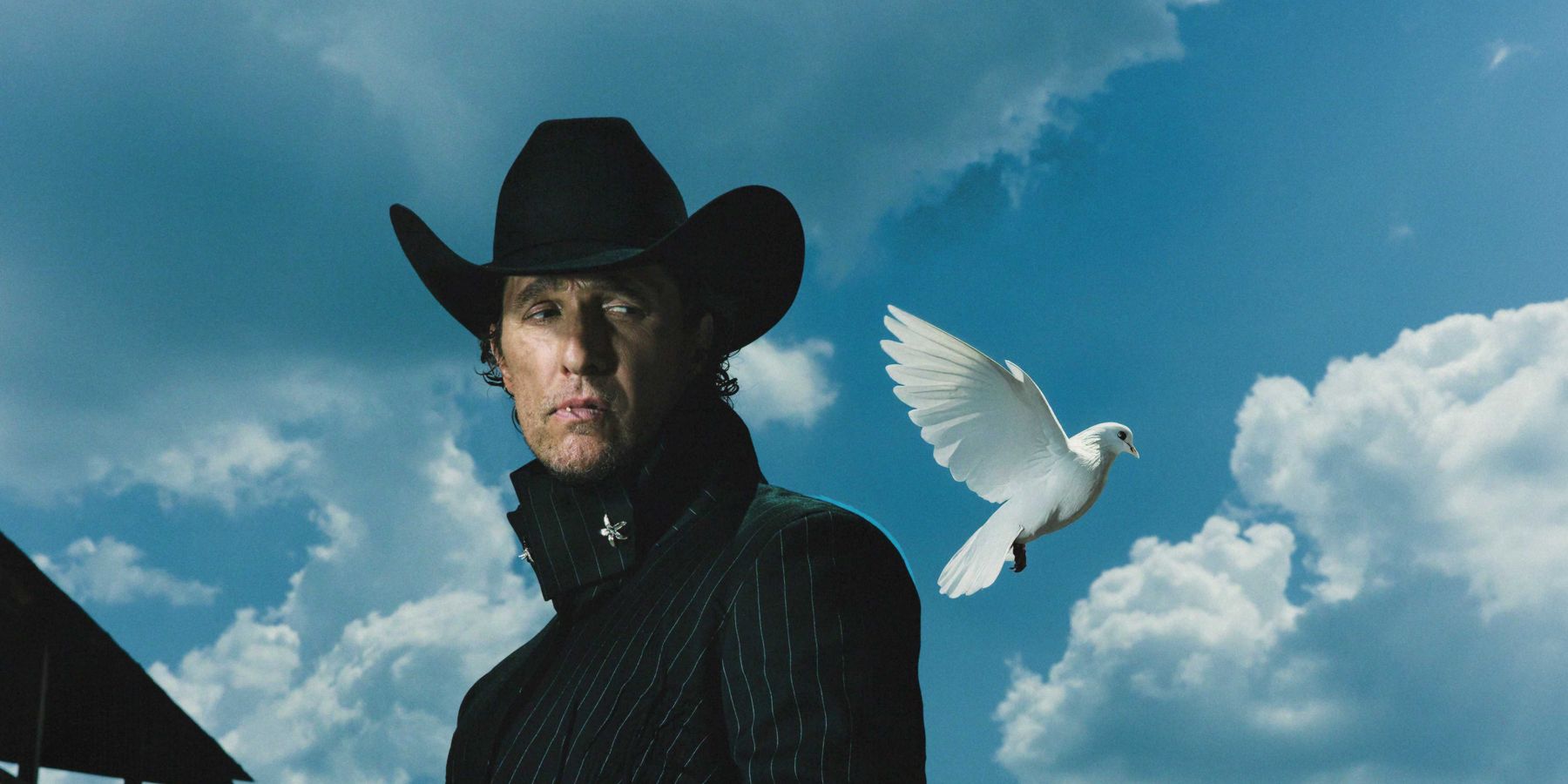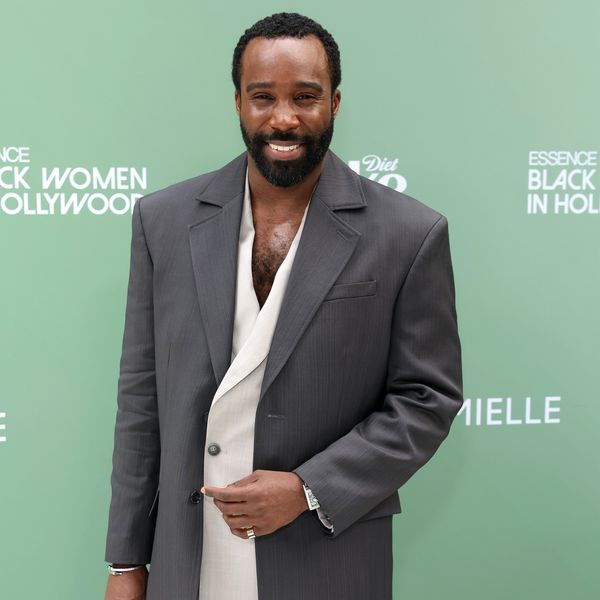
'Severance' Star Tramell Tillman Talks Milchick, Choreography and Merriment
Mar 21, 2025
If you're anything like us (and SZA), the three years between Severance season one and two were rough to put it mo-no-syl-la-bic-ally.
So, when the new season dropped in January, throwing us back into the world of Lumon and wild fan theories, silly memes and spiraling Reddit threads in an attempt to figure out what in Kier's name is going on — we were thrilled. If you don’t have an Apple TV+ subscription — or at least an ex who lets you borrow their login indefinitely — here’s a quick primer on the psychological thriller.
The Emmy Award-winning series (created by Dan Erickson and produced and primarily directed by Ben Stiller) follows Mark Scout (Adam Scott) one of the employees at Lumon Industries — a place where mysterious and important work takes place. Scout, like many of his colleagues, takes part in Lumon’s “severance” program, which keeps your memories and experiences at work separate from your memories and experiences for the rest of your life.
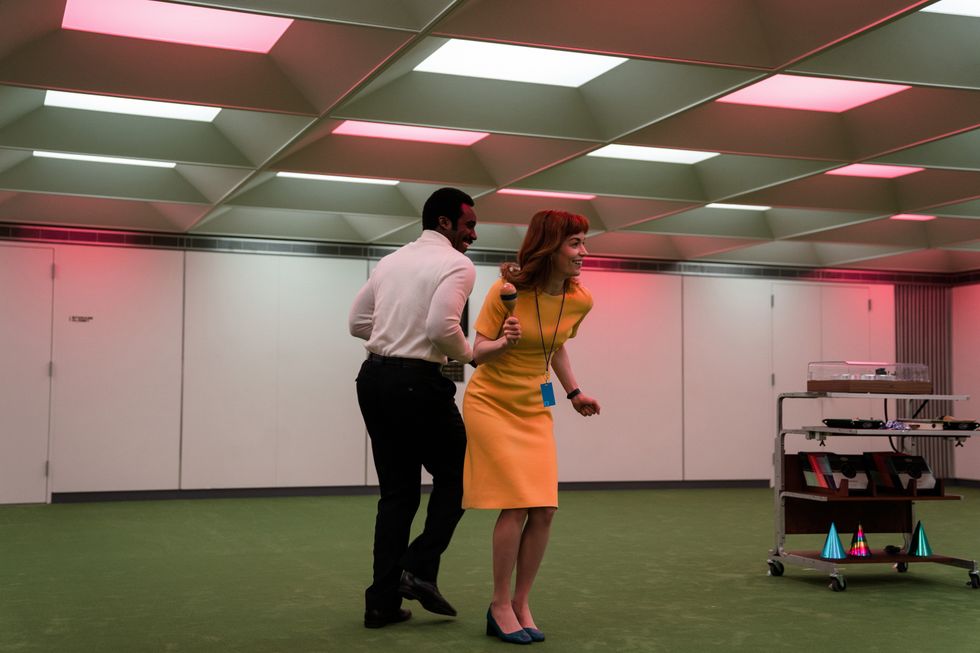
Last night, the series finale premiered, and, without giving too much away, the show has once again proven to be pristine, shocking, entertaining and staggering television that doesn't insult the viewer's intelligence nor stick to any of our well-thought-out theories. Amid all the plots in this epic season, one character's development from an exacting company man to a layered (sometimes) sympathetic boss who may not be exactly who he seems has stood out: Seth Milchick.
Answering to Mr. Milchick or (against his will) Mr. Milkshake and played by actor Tramell Tillman who has received SAG and Independent Spirit award nominations for his role, Milchick is the manager of the severed floor in charge of making sure that Macrodata Refinement (MDR) team get their work done. He also tries to keep the innies happy with an offsite that ended up being calamitous, the ability to meet with their outie's family (also calamitous) and, maybe most importantly, delightful music experiences.
Ahead of the finale and smack dab in the middle of his busy, and meteorically rising career — including multiple Broadway shows and starring alongisde Tom Cruise in Mission: Impossible - The Final Reckoning — PAPER hopped on a video call with Tillman to chat about how his character's role has changed throughout the two seasons, how real life DEI rollbacks are mirrored in the microaggressions Mr. Milchick experiences at Lumon and putting his own spin on choreography and merriment.
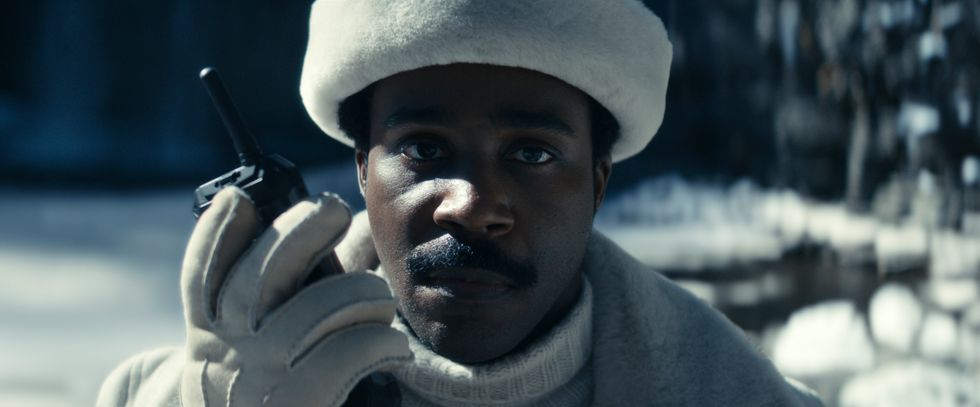
How are you feeling?
I’m feeling very good. I’m gonna be honest with you, I’m tired. This press tour has been very full and so fun. I don’t know if you’ve ever experienced being tired but energized.
Yeah, absolutely.
It’s like you wanted these things to happen, but once you’re in it, you’re not prepared for it and all of these things are going, and they’re happening. It’s crazy. It’s like you’re running this race, and you don’t want to stop. You just keep going.
I was going to ask this later but with the Severance finale coming up and this whole premise of compartmentalizing and finding balance and I know you not only have that coming up with Mission Impossible, multiple Broadway shows … are you finding ways to practice balance?
Nope [laughs]. Through all of the fun things that are happening that are crazy, wild, and unexpected, I’m reminding myself to breathe. My movement teacher told me we’re smarter when we breath and I find that to be very true, it helps me to remain balance. And to find things to do when I’m done with all the fun press and the travel that is just for me. If it’s watching an episode of Traitors or watching reruns of The Parkers. These are things where I can let my brain reset and chill.
I’m gonna take that advice as well. When you accepted the role of Mr. Milchick, were you aware of how much the character would change and evolve throughout each season? As a viewer, my first impression was that he was very self-possessed. Then, as we go through the second season, there are these moments and cracks that breakthrough. Were you aware you’d be playing with all those dimensions?
Absolutely not. The breakdown for the character was 20s-to-50s African American, enthusiastic company man. When I got the sides for the audition, the sides were the scenes with the red ball where Helly [played by Britt Lower] meets all the innies. I knew this guy was different, and I knew that this piece was different, and I was so excited to put my own zhuzh on it, put my flavor on it. And when I got the role, I said “Oh shit, I gotta keep doing this, I’ve go tot find a way to make this work.” It was tough in the beginning. Not only because we were filming during the pandemic and it was life and death situations but we were trying to find the tone of the show. We needed to rely on each other and trust one another and I hadn’t had the experience of working with Adam and Britt and John [Tutorro, who plays Irving] and Ben and Dan. This was my first time with them. It was scary but it was also really fun. It was a great actor challenge. And Milchick has exploded and I don’t think anyone anticipated that.
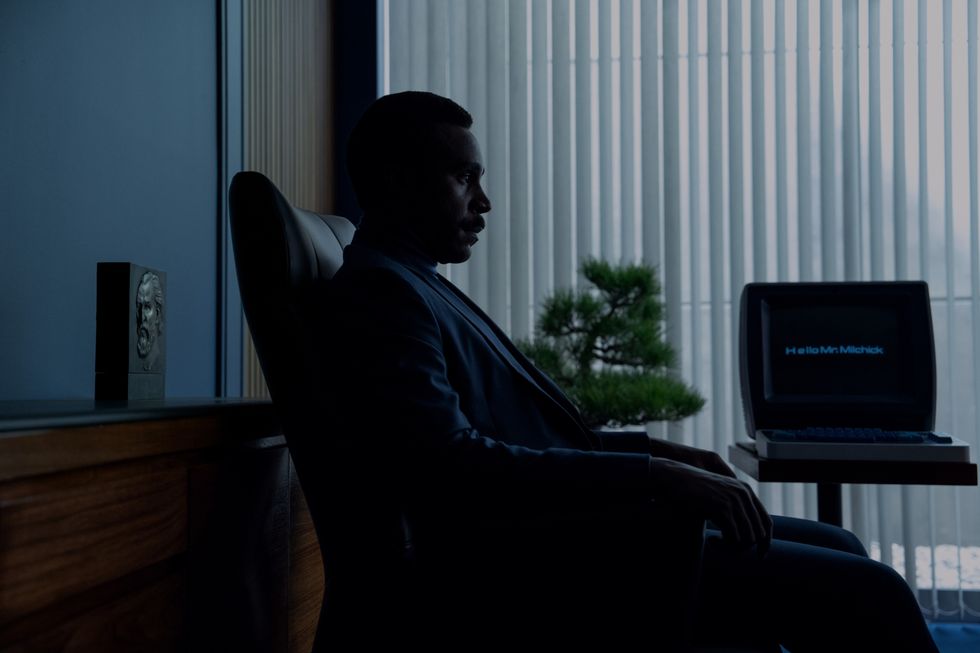
There's so much contrast in Milchick, this disciplinarian, authority figure, but also someone who is trying to bring in fun and levity to the innies — whether that’s through the calamitous Outdoor Retreat and Team-Building Occurrence [ORTBO] or through music and dance experiences. What do you think is driving this contrast?
I think it’s an aspect of his personality to make himself likable to the innies … I wonder if that’s also a psychological technique. To show, “Hey, I can be friendly, this is fun, we can have fun together as long as you get your work done.” There is a clear separation between Milchick’s tactic and [Harmony Corbel’s, who used to run the severed floor before Milchick, played by Patricia Arquette] tactics.
What I enjoy is the fact that all of these kindness reforms that he attempts to instill blew up in his face … like the ORTBO or the funeral [held for Irving after he’s fired from Lumon] … the OTC [Overtime Contingency Protocol, which activates innies while they’re outside of Lumon] from season one. The family visitation suite. I often see Milchick as a clown. He’s been given this impossible task, and he does his best to carry it out, and he fails or falters, and it’s so funny and so much fun.
I also want to talk about some of these chinks we’re seeing in Milchick’s armor. Specifically, that scene in episode nine, where Mark tells Milchick, “Work is just work,” after he doesn’t show up for work that day. There’s this pause and it seems like Milchick is realizing how much of his life has become about Lumon. What was it like to play that scene?
I give so much credit to Adam Scott in that moment. I think he tapped into something in me that I didn’t really even know the character was aware of. There was such a rawness to that phone conversation and I have to give him his flowers for that. When it comes to that moment, that pressure is on for Milchick for multiple reasons.We have to get this file done. Mind you, what we find out in episode 10 is that Milchick has this amazing extravaganza he's planning for when this is over. He’s still got to get back into the good graces of the board; he still has to prove himself. The stakes are high. He’s also in a moment of awakening which really began with him in episode three with the Kier paintings and realizes Lumon is kind of racist. He’s now trying to figure out his relationship to all of this. So, when Mark says, “It’s just work” I think that strikes a chord. Milchick has made his job and contributions to Lumon so much of his identity. This is a man who works around the clock. He revamped the entire breakroom, built a visitation suite, hired new innies, fired people, gave them a funeral within days notice. This man is bad, ok! He is the truth. And when you have a lot that going on and you’re being mistreated by the board, you’re being disrespected by the innies, you’re being challenged by your colleagues, there’s only so much you can take. I do believe there’s that little crack that’s there. I can only assume that man is tired.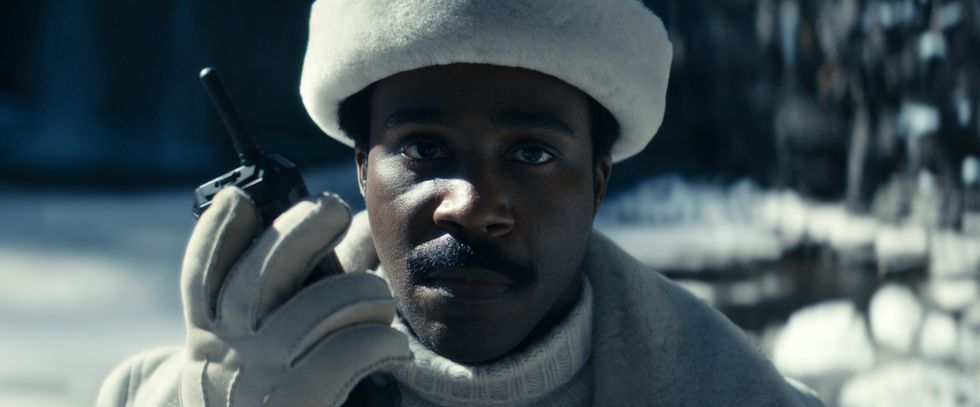
How did you feel about Severance addressing issues like microaggressions [The Kier paintings gift basically being blackface and Milchick being asked to use smaller words and phrases] given that as a sci-fi show, it could have avoided delving into real-life issues and topics?
I was very curious and cautious when the Kier paintings idea was presented to me. Because the creatives, as far as I know, aren’t well-versed in the experience of being Black in America and working in a corporate structure that is predominately white. I wanted to be sure that we treaded lightly in this subject, that we didn’t rush his experience, that we didn’t assume anything about himself or Natalie [played by Sydney Cole Alexander] and that Natalie also had a presence and voice in this experience.
I’m glad they were willing to be co-collaborative and continue to be co-collaborative in this story because adding this in was a huge risk. And I told them … not to say we have to get it right because I don’t know if "right" is a good word for it, but if we’re not careful of how we present it we can alienate a large portion of our audience because we’re not taking care of this story — this trauma if you will. So, there were constant conversations around when where and why these images exist and Milchick’s response to them. What I’m excited about is the reaction viewers are having and how they see themselves in this story, and how timely it is that this episode drops right around the time that DEI programs are being pulled from corporations in our country. These conversations need to continue to happen regardless of the administration, and you all are showing by your response to it that this is very visceral. Sydney and I were so excited about doing this scene together because we understood how important it was to tell this story.
The layers that exist in that … [Sydney] sending these photos from the board that we never see physically ... a woman who is very fair skinned to a man who is darker skinned. As I stepped through it, it reminded me of slavery, how Natalie is coming from the house to come down to the field to give a present from the board ... the masters. It’s not a moment for these two people singularly because the board is listening. What we learn later during the performance review is that Milchick is evaluated on how he responds to the gift. So it’s layers upon layers upon layers, of what this man is dealing with, of what Natalie has had to deal with … the fact that he reaches out to Natalie and she’s like curbed. And what does he do? He literally puts it away high up on a shelf and we never see a resolution. I’m glad they never resolve it in this season because this is not something that can be resolved in a single episode.
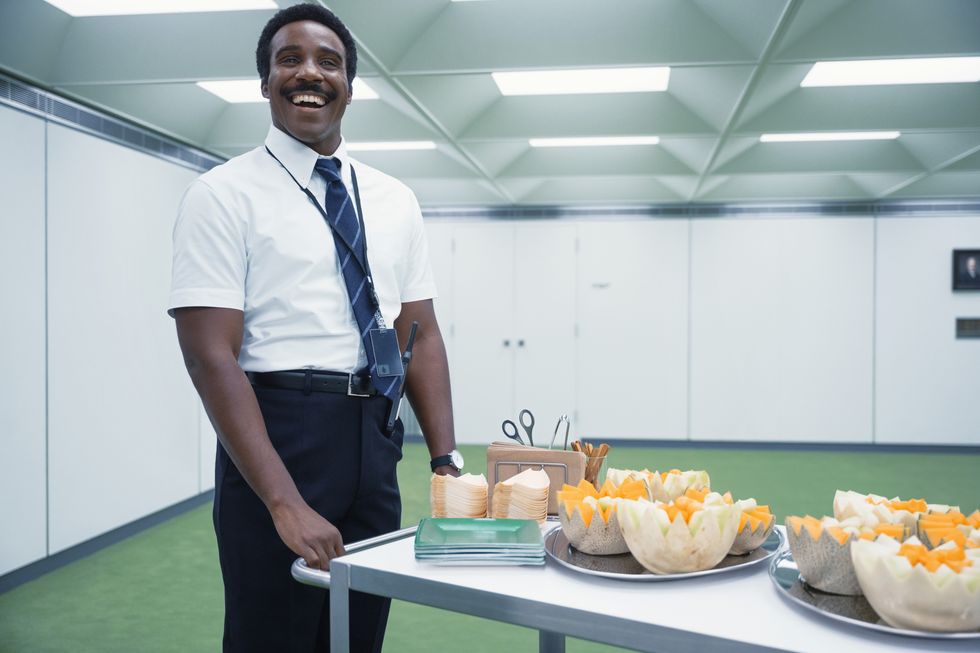
I also wanted to ask you about the scene with Mr. Drummond. I love that scene too much — it felt like Mr. Milchick was officially done. Right after that he does go back into work mode … but I’m curious about what that scene was like for you — what do you think it says about the direction his character is going in?
This is a moment when Milchick stands up for himself. He’s been taking blow after blow all the way from season one. Finally, he gets to push back and he does it so eloquently. It’s like [chefs kiss]. It’s so good, that “mo-no-syl-la-bic-ally” that’s the equivalent of I’m gonna clap on every syllable so you get what I’m saying. It was so rich I remember Uta Briesewitz who directed that scene, she said “I imagine that when this is played in theaters somewhere after this scene people are going to start cheering for Milchick.” Because it’s so glorious. And yes, he does go back to work because that’s just who he is, what he knows. But the next day when Mark does return to work and he finishes, Milchick does the introduction of choreography and merriment. We notice the first number is very traditional. But then he lets himself loose and he gets down and he taps into his roots and his blackness. He brings that to the severed floor, and I imagine that was such a relief to him, such a gift to him. It was so much fun to do.
I have to ask: How did that come together? It was so great.
Ben has an affinity for marching bands. He wasn’t sure how I was going to fit into the world of this marching band. His thinking was either band director or drum major. I went to two HBCUs; I started at Xavier University and finished at Jackson State University. Jackson State University is the home of the Sonic Boom of The South best marching band in the world. I, through Severance, lived a fantasy of mine of being a member of that band as a drum major and had so much fun putting that together. And here’s another opportunity we’re experiencing of Milchick allowing himself to be present on this floor, which is part of a corporation that would not ordinarily have this kind of music or flavor.
What do you hope people feel when they see the finale? And what do you hope they take away from your portrayal of this very complex character?
A sense of curiosity. I hope they become even more invested in his character and really start thinking What now? What’s gonna happen next?
Photography courtesy of Apple, Aliah Anderson/Getty/WireImage
Related Articles Around the Web
MORE ON PAPER
Entertainment
Cynthia Erivo in Full Bloom
Photography by David LaChapelle / Story by Joan Summers / Styling by Jason Bolden / Makeup by Joanna Simkim / Nails by Shea Osei
Photography by David LaChapelle / Story by Joan Summers / Styling by Jason Bolden / Makeup by Joanna Simkim / Nails by Shea Osei
01 December
Entertainment
Rami Malek Is Certifiably Unserious
Story by Joan Summers / Photography by Adam Powell
Story by Joan Summers / Photography by Adam Powell
14 November
Music
Janelle Monáe, HalloQueen
Story by Ivan Guzman / Photography by Pol Kurucz/ Styling by Alexandra Mandelkorn/ Hair by Nikki Nelms/ Makeup by Sasha Glasser/ Nails by Juan Alvear/ Set design by Krystall Schott
Story by Ivan Guzman / Photography by Pol Kurucz/ Styling by Alexandra Mandelkorn/ Hair by Nikki Nelms/ Makeup by Sasha Glasser/ Nails by Juan Alvear/ Set design by Krystall Schott
27 October
Music
You Don’t Move Cardi B
Story by Erica Campbell / Photography by Jora Frantzis / Styling by Kollin Carter/ Hair by Tokyo Stylez/ Makeup by Erika LaPearl/ Nails by Coca Nguyen/ Set design by Allegra Peyton
Story by Erica Campbell / Photography by Jora Frantzis / Styling by Kollin Carter/ Hair by Tokyo Stylez/ Makeup by Erika LaPearl/ Nails by Coca Nguyen/ Set design by Allegra Peyton
14 October
Entertainment
Matthew McConaughey Found His Rhythm
Story by Joan Summers / Photography by Greg Swales / Styling by Angelina Cantu / Grooming by Kara Yoshimoto Bua
Story by Joan Summers / Photography by Greg Swales / Styling by Angelina Cantu / Grooming by Kara Yoshimoto Bua
30 September




